Best Encapsulant Pairings for Long-Lasting, High-Efficiency Solar Modules
- RenewSys India

- Jul 21, 2025
- 3 min read
Updated: Jul 28, 2025
In the quest to enhance the durability, reliability, and efficiency of solar panels, the role of encapsulants is often underappreciated. While their primary function is to hold the layers of a solar module together, encapsulants serve a far greater purpose: protecting the delicate solar cells from environmental and chemical degradation over time.
From acetic acid formation to moisture ingress, and from Potential Induced Degradation (PID) to discoloration and snail trails, encapsulants are the decisive line of defence. With newer technologies like TOPCon gaining ground, the need for specialized encapsulant solutions has never been greater.
Why Encapsulants Matter in Solar Module Construction
Solar panels are typically built in two different ways:
- Glass-to-Glass (G2G): The solar cell is sandwiched between encapsulant layers and covered on both sides with glass.
- Glass-to-Backsheet: The bottom glass is replaced with a backsheet, reducing weight and cost.
In both cases, encapsulants are placed on both sides of the solar cell. Each layer has specific functional demands:
1. Top Encapsulant Layer: Exposed to sunlight and UV radiation, requiring UV resistance, high transmittance, moisture barrier, and yellowing resistance.
2. Bottom Encapsulant Layer: Lower exposure to sunlight but must have high PID resistance, excellent moisture barrier, and strong adhesion to avoid delamination or ribbon delinking.
Innovations from RenewSys: Solving Real-World Challenges
RenewSys has developed advanced encapsulants tailored to address specific degradation pathways:
- AA EVA (Anti-Acid EVA): Formulated to prevent the formation of acetic acid, a common byproduct of EVA degradation that leads to corrosion and electrical leakage.
- POE ENT (POE for TOPCon): A next-gen POE encapsulant designed specifically for the unique structure and sensitivity of TOPCon cells, overcoming limitations of conventional POE encapsulants.
What Makes an Ideal Encapsulant Pairing?
A high-performance encapsulant pairing should optimise the following:
• UV Protection (Top Layer)
• High Light Transmittance
• Moisture Barrier (Both Layers)
• PID Resistance (Both Layers)
• Thermal Stability
• Yellowing Resistance (Top Layer)
• Chemical Inertness (Both Layers)
Popular Encapsulant Pairings for Glass-to-Glass TOPCon Modules
1. Cost-Optimized, Performance-Oriented
Pairing:
• EPE UVT: High UV resistance and excellent light transmittance
• EPE 360: Balanced moisture barrier and durability at an optimized cost
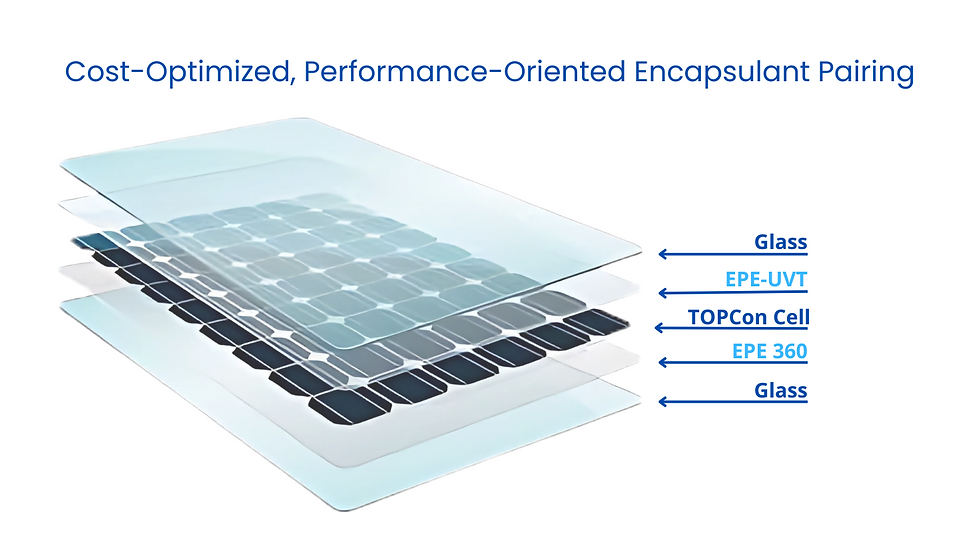
2. Economical with High Output Encapsulant Pairing
Pairing:
• Combines affordable materials with strong UV and moisture protection
• EVA UVT offers high transparency and better yellowing resistance
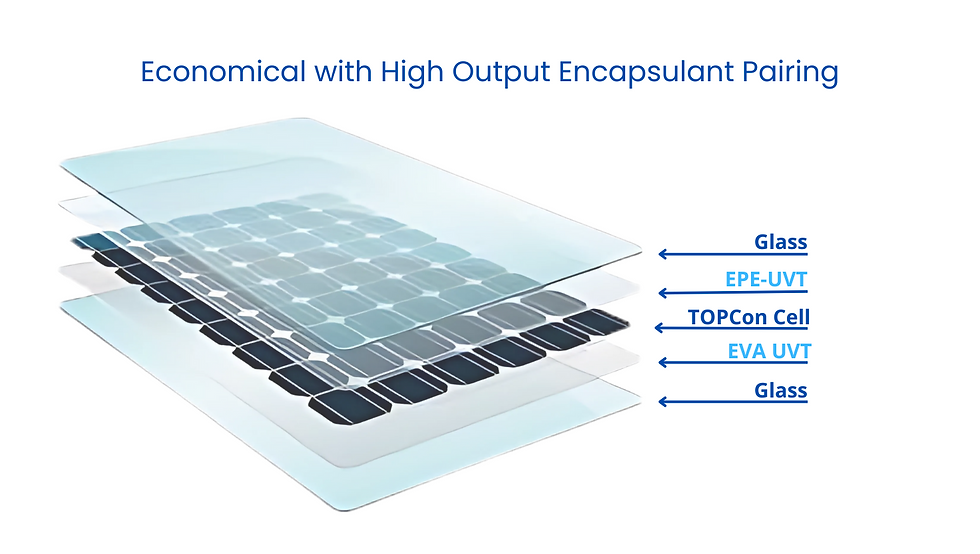
3. Most Reliable Combination Encapsulant Pairing
Pairing:
• Dual POE encapsulant layers ensure supreme PID resistance and moisture barrier
• Recommended for high-humidity, long-life applications
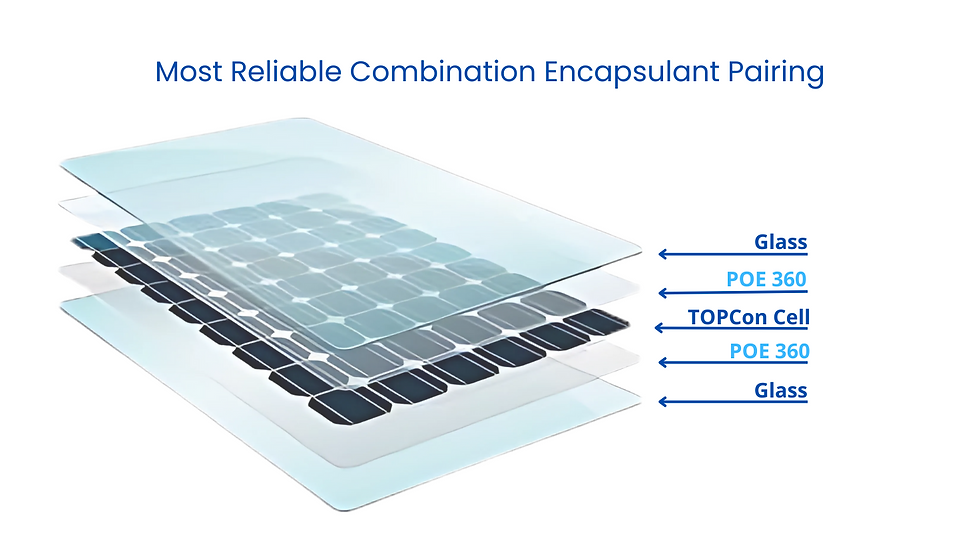
Next-Gen Encapsulant Pairings from RenewSys
1. High Output & Anti-Yellowing for Extended Life
Pairing:
• Advanced anti-acid formulation reduces the risk of acetic acid formation
• UVT variant ensures superior light transmittance
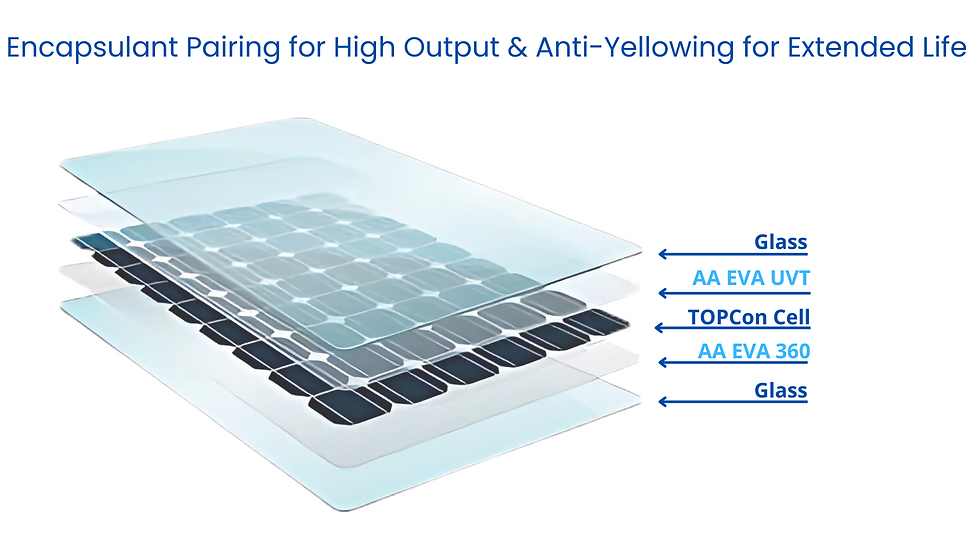
2. Premium POE-ENT for TOPCon Modules
Pairing:
• Engineered to meet the specific challenges of TOPCon architecture
• Exceptional PID resistance, long-term optical clarity, and low shrinkage
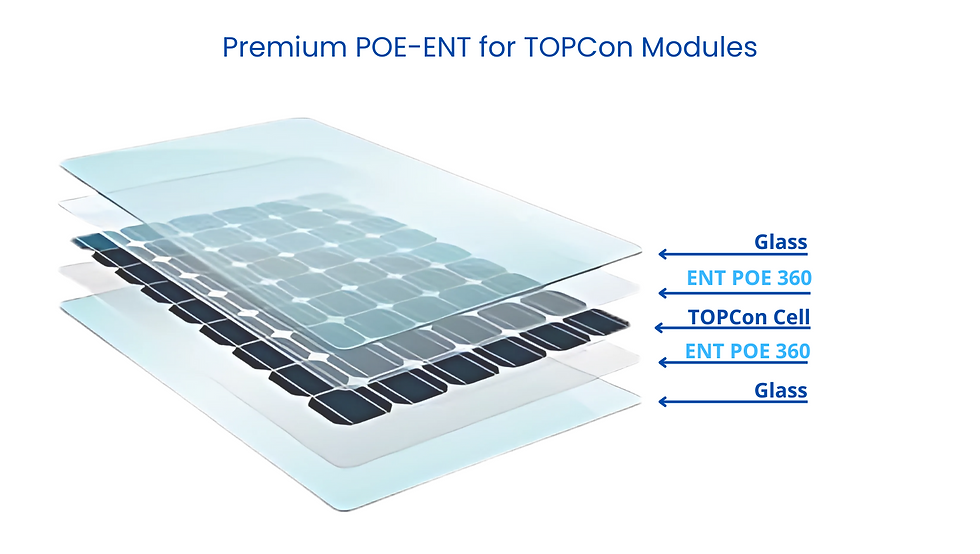
Conclusion
Encapsulants are more than just adhesives – they are performance enablers. With increasing demands for long-term durability and efficiency from solar modules, choosing the right encapsulant pairing has become a strategic decision.
Whether your goal is cost optimization, maximum energy yield, or long-term reliability, RenewSys’ innovative encapsulants such as AA EVA, EPE UVT, and POE ENT provide tailored solutions that meet the evolving demands of modern solar technology.
Invest in the right encapsulant pairing — because the strength of your solar module lies not just in the cell, but in everything that protects it.
Reference: RenewSys R&D




